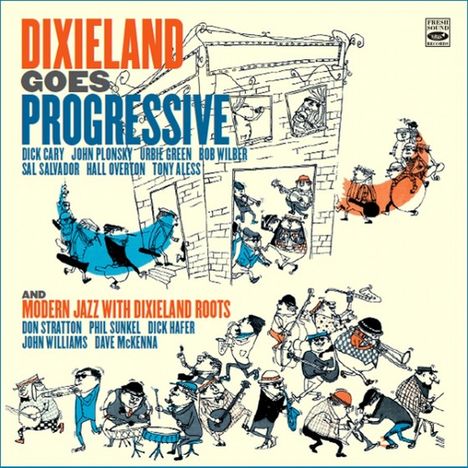Dixieland Goes Progressive / Modern Jazz With Dixieland Roots auf CD
Dixieland Goes Progressive / Modern Jazz With Dixieland Roots
Herkömmliche CD, die mit allen CD-Playern und Computerlaufwerken, aber auch mit den meisten SACD- oder Multiplayern abspielbar ist.
(soweit verfügbar beim Lieferanten)
- Label:
- Fresh Sound
- Aufnahmejahr ca.:
- 1956-57
- Artikelnummer:
- 8132090
- UPC/EAN:
- 8427328609500
- Erscheinungstermin:
- 26.2.2018
* Dick Cary, John Plonsky, Urbie Green, Bob Wilber, Sal Salvador, Don Stratton, Dick Hafer, John Williams u. a.
»Progressive Dixieland« is a term which would appear to be self-contradictory, the two words being often used individually to describe two different conceptions of jazz. Judged by their work on Dixieland Goes Progressive, Dick Cary and John Plonsky must surely be listed as two of the brighter arrangers in the field of jazz history.
Given identical assignments-the refurbishing of Dixieland standards in the manner of progressive jazz-they both accepted the challenge and came up with a fresh concept of old music which is astonishingly pleasant and thoroughly amusing, which seems to indicate that there is a point at which both concepts and sounds can come together without being out of context with one another. Throughout the album, men like Urbie Green, Sal Salvador, Hall Overton, Tony Aless, Johnny Glasel, Don Arnone and, of course, Cary and Plonsky themselves, are consistently wonderful.
On Modern Jazz with Dixieland Roots, Don Stratton and Phil Sunkel went about adapting chiefly Dixieland opuses to their own use, and they wrote two originals apiece. First they assembled a group with unique instrumentation, yet one based firmly in jazz history. Two trumpets lead the way here-lead it brightly and weavingly and with sensitive interplay.
Abetting them is the muscular tenor saxophone of ex-Woody Hermanite, Dick Hafer. Rhythm section is bassist Chuck Andrus, drummer Karl Kiffe, and Dave McKenna and John Williams splitting piano chores. The set swings, and the men responsible are clearly modernists, with roots not only to some extent in Dixieland, but more tellingly in the blues and in the best of the swing era.
Tracklisting
Disk 1 von 1 (CD)
-
1 Mahogany Hall Stomp
-
2 Muskrat Ramble
-
3 That's a Plenty
-
4 St. James Infirmary
-
5 Darktown Strutters' Ball
-
6 Milenberg Joys
-
7 Royal Garden Blues
-
8 High Society
-
9 Way Down Yonder in New Orleans
-
10 Basin Street Blues
-
11 When the Saints Go Marching In
-
12 South Rampart Street Parade
-
13 Black Bottom
-
14 Wigglin' an' Gigglin'
-
15 What Is This Thing Called Love?
-
16 Sunday
-
17 Moxahala
-
18 Royal Garden Blues
-
19 Sow Goo Mang
-
20 Charleston
-
21 Yesterdays
-
22 R.H.S.

